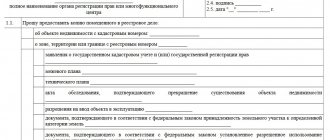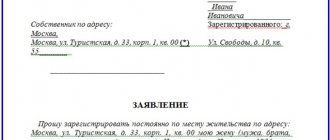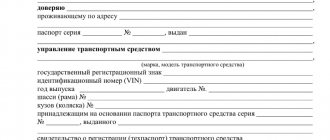Conditions
The right to use residential premises arises on the basis of registration at the place of residence or place of stay.
Having a residence permit or registration implies:
- Protection of housing rights.
- Obligation to pay utility bills.
- Opportunity to take part in the privatization procedure (only with permanent registration).
- Possibility to live in residential premises (indefinitely or temporarily).
Eviction of citizens registered temporarily occurs by submitting an application to the Federal Migration Service about the need to terminate registration.
Registration provides the resident with broader rights, and it is more difficult to get rid of his presence.
How to evict a person from an apartment if he was not registered in it?
There are 2 ways:
- Voluntary. A person who has lost the right of residence is independently deregistered.
- Forced. Based on the writ of execution, a citizen is deregistered without his consent.
The grounds for forcibly evicting a registered person from an apartment must be very serious. The reasons why the copyright holder may demand to vacate the occupied home are:
- Violations of the conditions for the provision of housing from the municipality.
- Failure to pay a mortgage.
- Expiration of the contract term.
- Long-term violation of the rights and legitimate interests of neighbors.
- Damage or harm to the premises, leading to a deterioration in the quality of living.
- Other grounds provided by law.
Is it possible to evict from an apartment?
Is it possible to evict a person from an apartment if he is registered there?
Yes, if there are sufficient reasons for this. The person is recognized as having lost the right of residence and is required to leave the living space. However, there are categories of people who cannot be evicted.
These include:
- Persons who refused their assigned share during privatization.
- Current and former members of the housing cooperative who have paid the share contribution in full or in part.
- Minors temporarily staying in an orphanage, as designated by the guardianship authorities.
From the municipal
Eviction of a registered person from a municipal apartment may occur for the following reasons:
- Decommissioning of the premises.
- Inclusion of the building in the register of buildings awaiting liquidation.
- Reconstruction work or major repairs.
- Transfer of the house to a religious organization.
If these circumstances arise, the citizen is obliged to provide another comfortable home.
Is it possible to evict a registered person from an apartment without providing living space to replace the one occupied?
Yes, if the reason for eviction is:
- The person facing discharge has been living at a different address for an extended period of time.
- The decision to provide premises was declared invalid.
- The person’s actions resulted in damage to the residential premises.
- Changes in the conditions under which housing was provided.
- The person is recognized as not having received the right of residence.
- Violation of the law.
From privatized
Only the owner of the residential premises can initiate the eviction of a registered citizen from a privately owned apartment. Sufficient reasons for this are:
- Change of owner of real estate (sale, exchange of living space).
- Change in marital status. This applies to spouses, children of spouses, parents of spouses, i.e. to those who are not blood relatives of the owner.
- Termination of a commercial lease agreement.
- Inappropriate use of residential premises.
- Unlawful actions towards other residents and neighbors.
Persons who have lost the right to use housing must be asked to voluntarily leave the occupied property. In this case, the owner’s obligation to provide living space in exchange for the occupied space does not arise.
Refusal to evict from private property is possible for the following reasons:
- The share in the apartment belongs to the person they want to write out.
- A citizen has the right to live indefinitely in this living space.
- The person is dependent on the owner of the property.
- A marriage contract or agreement has been concluded between the spouses, on the basis of which the non-owner spouse retains the right of residence after a divorce.
Minor
Eviction from an apartment of a person under the age of majority is considered by the court with the participation of the guardianship authorities. It is impossible to evict a child without their approval.
In addition, in order to evict a minor, a number of conditions must be met:
- A child can be discharged if he is registered with another parent.
- If a child is registered with one of the parents, discharge is possible only with one of them.
- The conditions in which the child will be registered must be no worse than before.
- If the child had a share of ownership in the residential premises, then eviction is possible only if he is allocated a similar share of ownership at the new place of residence.
When the owner of the property changes
Quite often, new property owners are faced with the fact that a person lives in the purchased property who has no intention of vacating the premises. Is it possible to evict a registered person from an apartment if there is a change of ownership?
New owners have 2 possible solutions:
- Agree with the former owner. According to Article 292 of the Civil Code of the Russian Federation, when registering a transaction for the transfer of ownership, all registered persons must sign out and leave the premises.
- File a claim. If the new owners refuse to comply with the legal demands, the issue is resolved through the courts.
If the person insisting on living in the apartment is disabled, the court may give him time to find a new place of residence
Without agreement
If a person whose right to live in a given apartment refuses to voluntarily leave the premises, the question arises of how to evict the person from the apartment? A registered person can be expelled from an apartment without his consent only on the basis of a court decision. To do this, the following conditions must be met:
- there are sufficient reasons to evict the registered tenant.
- there is documentary evidence of the need for eviction.
- There are title documents for the property.
- There are recorded attempts to resolve the problem through negotiations.
The owner does not have the right to change door locks or forcefully remove unwanted persons. An attempt to resolve the issue using illegal methods gives the injured party the right to demand compensation.
After a court decision on eviction is made, a person is obliged to leave the illegally occupied apartment. Otherwise, the owner of the apartment with the court decision is sent to the bailiff service.
For debts
Debt to utility services is sufficient grounds to evict a person from the occupied living space.
A citizen will be kicked out of an apartment if he systematically (that is, for six months or longer) has not made payments for housing and communal services. It depends on the grounds for living in an apartment whether a citizen will be evicted with the provision of another living space to replace the one occupied, or without provision.
- From privatized housing, eviction will be carried out without providing a new place of residence.
- According to the social tenancy agreement, the tenant has the right to evict only to another residential premises.
Existing debt on utility bills will be repaid at the expense of the debtor’s property.
The court's refusal to evict a registered person for debt is possible if the citizen proves that the payment debt arose for a good reason.
Such reasons include:
- Long-term illness of the prescribed person or his family members.
- Loss of a job.
- Availability of disabled dependents.
- Delay of wages due to the fault of the employer.
How to kick a guest out of your apartment
to expose distant relatives who have arrived, but it is possible, it is advisable to immediately indicate to them the boundaries of what is permitted. Say that just the next day after they leave you will have important things to do or a crowd of classmates will come to you to celebrate 10 years of graduation from university. If you don’t mark the boundaries, your apartment will be used as a hotel by all your distant relatives and their grandchildren.
“Make yourself at home, but don’t forget that you are a guest.” Everyone has an annoying friend who is ready to “eat up” your entire kitchen and eat a romantic dinner, obviously not prepared for three. To prevent this from happening, have the courage to warn him that you can’t eat everything in your refrigerator.
We recommend reading: Cumulative part of the pension for a deceased father
The procedure for eviction from an apartment of a registered person - not the owner
According to Article 40 of the Constitution of the Russian Federation, everyone has the right to be provided with permanent housing.
Arbitrary deprivation of this right is not permitted. The procedure for a citizen’s loss of the right to housing is strictly regulated by government agencies. How to evict a registered person from an apartment?
The procedure should be as follows:
- Sending a warning about eviction to the person who must evict. It indicates the reasons and sets the deadline within which the citizen is obliged to leave. It will be indisputable evidence that the copyright holder made an attempt to resolve the case pre-trial.
- If a citizen refuses to evict, then preparations for a trial begin. Includes collecting the necessary documents and drawing up a claim.
- Filing a claim.
Court decisions
How to peacefully resolve housing issues
My housing: what to do if they try to kick you out of your apartment
How to protect property rights after divorce
On your own rake: what nuances should not be forgotten when it comes to the housing issue
Unwanted neighbor: how to defend your rights to an apartment?
Apartment disputes: eviction of a family member
Going to court
According to the principle of jurisdiction, the application is submitted to the district court at the location of the property.
A claim for eviction from an apartment of a registered person who is not the owner can be filed by:
- property owner. Individual or municipal authorities;
- third parties whose rights are systematically violated.
Eviction claims from other persons will not be considered in court.
In order for the court to accept the case for consideration, the following documents must be prepared:
- a statement of claim demanding “to recognize the citizen as having lost the right to use”, or “to recognize him as not having acquired the right to use”;
- evidence of a person’s loss of the right to use housing;
- certificates of registration of ownership;
- certificate of registration;
- paid state duty;
- other documents.
The court must make a ruling within 2 months. The person is given another month to appeal the decision in a higher court. At this time, it is impossible to evict a citizen.
The following may be used as evidence:
- Testimony of witnesses.
- Papers confirming the lack of payment of housing and communal services bills.
- certificate from the registry office about a change in marital status.
- Acts of the sanitary and epidemiological service.
- Expired commercial lease agreement.
- Applications and complaints to regulatory authorities.
Customer Reviews
Feedback from Solovyova I would like to express my deep gratitude to lawyer Konstantin Vasilyevich Solovyov for his qualified assistance in resolving my issue. The decision was made in my favor, for which I am very grateful. I would also like to express my gratitude to the company’s team for their sensitive attitude towards clients.
Gratitude from N.A. Tomashpolskaya I would like to express my deep gratitude to Alexander Viktorovich Pavlyuchenko for his competent legal advice and sensitive, attentive attitude towards me, who found myself in a difficult situation.
Sincerely, Tomashpolskaya N.A. 07/01/18
Gratitude from Gordeeva E.S. I express my special gratitude to Sergei Vyacheslavovich for his highly competent and detailed consultation on the issue of the employment contract.
Doctor of Philological Sciences, Gordeeva E.S. 12/01/2018
Gratitude to Kavalyauskas V.A. from Astafieva A.S. I express my gratitude to the Legal Agency and in particular to lawyer Vasily Anatolyevich Kavaliauskas for the skillfully done work. Vasily Anatolyevich advised and prepared all the documents necessary for court proceedings. As a result of the consideration of the consumer rights case, the result and the high amount exceeded all my expectations. Thank you very much for your qualified work and professionalism.
Sincerely, Astafieva A.S., 03/01/2019
Thanks to Mavrichev S.V. from Bars Dan A. I thank the wonderful Lawyer Sergei Vyacheslavovich Mavrichev for thorough, competent advice and human mutual assistance to all his clients who are in deep need of qualified and timely legal and psychological advice.
Leopard Dana A. 09/18/2018
Gratitude from Volkova N.E. I express my gratitude to Vasily Anatolyevich for his professional and competent assistance in resolving the issue of protecting my consumer rights. As a result, I received decent compensation from. Thank you!
Volkova N.E. November 30, 2018
Gratitude from V.N. Skorokhodova Dear Alexander Viktorovich! Let me express my sincere gratitude to you for your understanding, sensitive approach to the situation, openness, emotions and professionalism. I wish you good luck, success in your work and prosperity.
Sincerely, Skorokhodova V.N.
Review by Egorova A.N. I, Egorova Antonina Nikolaevna, am very pleased with the consultation of Yuri Vladimirovich Sukhovarov. Thank you for your attentiveness and understanding. I wish you further professional growth.
Gratitude from N.S. Khokhlov I am Khokhlov N.S. I express special gratitude to lawyer A.V. Pavlyuchenko who defended my consumer protection rights. I was pleasantly surprised by his professionalism, where he discovered the false address of my defendant registered in the Unified State Register of Legal Entities, and also defended me, as I believe, from the unreasonable decisions of the trial judge. If I need legal assistance in the future, I will only turn to A.V. Pavlyuchenko.
N.S. Khokhlov December 12, 2017
Review by Minina M.V. I would like to express my deep gratitude to Yuri Vladimirovich Sukhovarov for his competent advice and qualified assistance on my issue.
With gratitude, Minina Margarita Vladimirovna.
Sample claim
Drawing up a statement of claim is an important part of preparing for the trial.
Requirements for the preparation and execution of such documents are given in Articles 131 and 132 of the Code of Civil Procedure of the Russian Federation. A sample Eviction Claim can be found in the “GARANT” and “CONSULTANT +” consulting systems. However, for its correct execution, it is better to additionally consult with a lawyer.
The structure of the statement of claim should be as follows:
- Introductory part. Contains details of the parties (last name, first name, patronymic, address), name and address of the court, grounds for ownership of the residential premises, a list of persons registered in the residential premises.
- Descriptive part. It describes the essence of the problem and lists the measures taken for a peaceful settlement. The facts specified in this part must be documented.
- Motivational part. Legislative arguments for satisfying claims, indicating specific regulations.
- The operative part contains the plaintiff's demands.
- Applications to the claim. Contains a list of documents attached to the application.
Arbitrage practice
Due to the fact that the right to housing is one of the most important constitutional rights, the court will especially carefully consider all the circumstances of the case.
Issues regarding forced deprivation of the right to use housing are classified as cases that are considered with the mandatory participation of a prosecutor:
- OJSC Mortgage Lending Agency filed a claim for eviction against persons who violated the terms of the agreement. The defendants are spouses and their minor child. The court found that a gross violation of the terms of the mortgage loan on the part of the defendants resulted in the loss of the right to reside in the apartment. The plaintiff's demands were recognized as legal and justified, and the court issued an eviction order. The higher court, where the appeal was filed, left the previous decision unchanged.
- The district administration filed a lawsuit to evict the citizen from an apartment owned by the municipality. Grounds for eviction are the presence of debt on payments for the provision of utility services. The period during which the defendant did not make payments to housing and communal services was 8 months. When considering the case, the reasons for which payments were not made were recognized as valid. The claims for eviction and deregistration were denied.
Eviction of a person who previously had the right to reside in an apartment is a rather complex legal issue with many nuances. Depending on age, ability to work, length of stay in the apartment and other circumstances, the decision to deprive the right of residence will depend. An experienced lawyer will help you understand the situation and offer the optimal solution to the problem.
Protection of registered residents from eviction
The difficulty of forced evictions of registered tenants lies not only in the need for the owner of the property to provide evidence of the defendants’ loss of rights to reside in the relevant apartment.
A registered citizen has the right to submit a counterclaim to the court, for example, to recognize the housing as jointly acquired property, and at the same time demand that the court grant the possibility of indefinite residence in the living space.
In addition, the judge, when deciding on the possibility of eviction, will take into account the diverse individual nuances of each situation (the provision of the evicted citizen with his own living space, the real possibility of the defendant purchasing his own home, etc.).
Such moments, as well as the possible arguments of the defendant being evicted from the apartment, can not only significantly delay the legal proceedings, but also serve as the reason for the judicial refusal to evict a citizen who is not considered the owner of the property.
Counterclaims by evicted former family members are a very common phenomenon in practice today. Consequently, the plaintiff should clearly think through in advance how to prove to the court that the evicted defendant does not have rights to the disputed residential property.
Considering two claims at the same time - for the eviction of a tenant and a counterclaim against him - the judge can also, on his own initiative, begin to consider the issue of granting a deferment for a specific period to the defendant being evicted from the living space.
How to register ownership of a garage
Procedure for drawing up a land plot plan
Removal of mortgage encumbrance from an apartment
Important nuances for the buyer when choosing an apartment with an open plan
Sample lease agreement for a land plot with the right to purchase
Agreement for free use of residential premises









